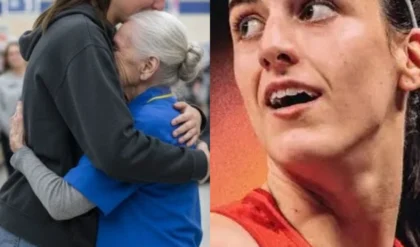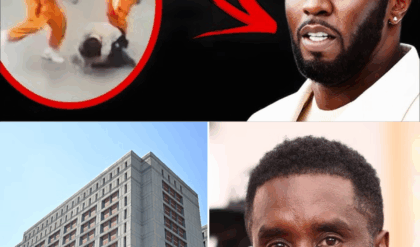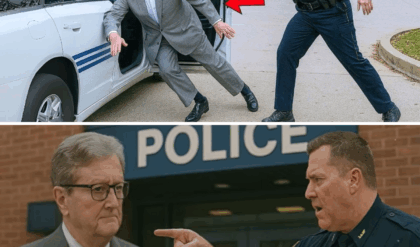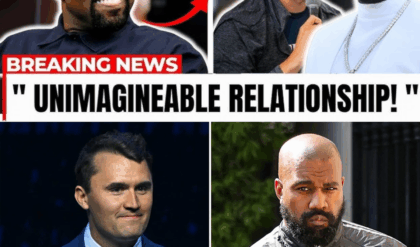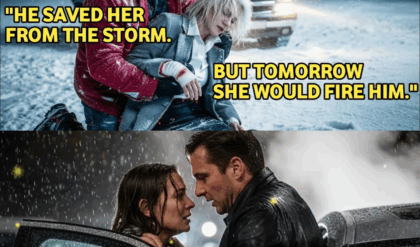When my neighbor knocked on my door at 5AM and urgently said, “Don’t go to work today. Just trust me,” I was confused and a little scared. Why would he warn me like that? By noon, the shocking truth behind his words became clear — and it changed everything.
Part I — The Knock
The pounding started before the morning did. Three quick blows, then two, then a pause that let the silence tell me it was real. The clock read 5:02. Everything in me that knew how to sleep also knew that nobody decent knocks at that hour for anything simple.
I pulled on a sweatshirt and padded through the house I’d inherited and never made my own. The hall smelled like lemon cleaner and the dust of books that had belonged to my grandmother. At the door, I peered through the peephole and saw my next-door neighbor, Gabriel Stone, standing on the stoop as if the night had left him there and forgotten to take him back. He was pale, breathing in short, controlled bursts. The porch light made a geometry out of the bones in his face.
I opened the door two inches. Cold air reached through the gap like a hand. “Gabriel?”
“Don’t go to work today.” His voice didn’t carry panic. It carried urgency’s quieter cousin. “Stay home. Just trust me.”
I blinked at him. We had never exchanged more than borrowed-ladder courtesies and the kind of smiles you give when you meet by the mailbox and both of you are holding junk mail. He was the kind of neighbor you don’t notice until something goes wrong and he’s already fixing it. He had moved in a year ago with a U-Haul and no fuss, and if he had a life beyond our fence line, I had never seen it.
“What are you talking about?” I asked, pushing the door open farther, not because I trusted him but because curiosity tends to outpace caution when it’s wearing a familiar face.
He glanced over my shoulder, then past me into the street as if danger could be punctual. “I can’t explain right now. Just—promise me you won’t leave the house today. Not for any reason.”
“Gabriel, you’re scaring me.”
“You’ll understand by noon.” He stepped back, scanned the empty street one more time with a gaze that knew how to measure distance, and jogged toward his door. The motion sensor light over his porch flicked on and turned him into a paper cutout. He didn’t look back.
I stood there with the dawn thinking about fear and about odd mercies. The rational part of me—the one that color-codes expense reports and is soothed by spreadsheets—started composing reasons to ignore him. People have breakdowns. People dream bad dreams and can’t shake them. People get the wrong address.
Then there was another part. The part my father had taught me to listen to when he said, “You can read the world or it will read you.” Three months earlier, he had died, a stroke that came like a thief and left no fingerprints. Two weeks before that, he had called me three times to say he needed to show me something, and each time, when I asked what, he’d said, “It’s about our family. It’s time you knew,” and then changed the subject. Since the funeral, small strange things had rearranged themselves around my life. A black sedan with tinted windows sat across from my driveway for an hour on a Tuesday and then disappeared. Blocked calls that breathed quietly and hung up. An email that asked if I would be in the office Tuesday and didn’t sign a name. My sister Sophie called from Nairobi and asked if anyone new had moved onto the block. “You always say I’m paranoid,” she said. “But you learned it from me.”
The pile of oddities never weighed enough to break the table. It did, however, creak when I put anything else on it.
I texted my manager: personal emergency—won’t be in—will make up the time. I put my phone face down and waited for nothing to happen.
At 8:33, a jogger’s shoes tapped the sidewalk like metronome ticks. At 10:12, the mail carrier slid envelopes that could not matter into a slot that suddenly did. By 11:30, the kitchen clock’s tick had turned into a small act of violence. Nothing had happened except me and my breath in a room that remembered other people. I had started to feel foolish when the phone rang.
Unknown number. I answered. “Ms. Rowan? This is Officer Taylor with the county police department. Are you aware of an incident at your workplace this morning?”
“What incident?”
“A critical one.” A pause with the weight of a decision. “There has been a violent attack. Several employees are injured. We need to verify your safety. Security logs show your key card was used at 8:02 a.m. Your vehicle appears to have entered the garage. You were reported on the third floor moments before the alert.”
“That’s impossible.” The room tilted like a boat that wasn’t sure which way the water meant to push it. “I’ve been home. I haven’t—”
“Is there anyone who can verify that?”
I looked around at my grandmother’s plants and a couch with one too many blankets. “I live alone.”
“I understand,” he said, the way professionals do when they are about to say something that will change the room anyway. “Units will be sent to your address for your safety and for questioning.”
“Questioning?” I heard my voice harden into a different metal. “Why would I be questioned?”
“Items belonging to you were found near the scene.”
My mind flicked through the last month and stuck on images like burrs: a man in a sedan checking his watch, a text about Tuesday, the sensation of returning to a room that had been ever so slightly wrong. Gabriel’s face at dawn. Don’t go to work today.
“Did the footage show who got out of my car?” I asked.
“The footage is corrupted,” the officer said tightly. “We see your plates. We don’t see a face.”
“Of course you don’t,” I said, and hung up.
The knock came five minutes later. Not frantic. Not friendly. A sound that respected itself. I stepped to the peephole. Gabriel.
“Alyssa,” he said when I didn’t open the door. “We need to talk.”
“How did you know the police would call me?” I asked the wood.
“Because they’re not coming to help you,” he said, soft enough to be dangerous. “They’re coming to place you under federal custody. You were never supposed to wake up in your own bed this morning.”
I opened the door because fear had finally coughed up what it had been shielding: doubt. And doubt had left.
“Explain,” I said.
He slipped inside and shut the door with a speed that made me grateful for quiet hinges. He went to the kitchen window and scanned the street with a habit that had trained his body to catalog angles. Then he turned to me and said a sentence that rearranged my grief.
“I didn’t move next door by accident,” he said. “Your father asked me to watch you.”
Part II — The File
“My father was an accountant,” I said, because sometimes denial chooses the smallest possible weapon.
“Your father pretended to be one,” Gabriel said. “It was an effective cover.”
“For what?”
“For a covert investigation that spanned nineteen years and ended with a poison that looked like a stroke.”
My hands remembered the table and found it. “Sit,” I said. I wasn’t sure which of us I meant.
He handed me a black envelope that had once held money. Inside, a note in my father’s hand.
If you’re reading this, then what I feared has come to pass. You are not in danger because of anything you did. You are in danger because of who you are. There is more to your identity than you know. Trust Gabriel as you once trusted me. Do not surrender yourself. If they take you in, you will disappear.
“Who am I?” I asked. It sounded dramatic in my mouth. It sounded sensible in my ears.
“You’re a human being,” Gabriel said, and then corrected himself. “You’re also a dataset. A scandal. A proof.”
He placed a tablet on the table and swiped it awake. My name glowed on the screen. ROWAN, ALYSSA—SUBJECT 7B—GENOMIC ASSET—HIGH PRIORITY—ORIGIN INITIATIVE. Below it: charts, codes, phrases that pretended to be boring. IMMUNE MARKERS NOT FOUND IN GENERAL POPULATION. PAN-PATHOGEN RESISTANCE INDEX: ANOMALOUS. BONE MARROW REGENERATION: ELEVATED. ACCESS RESTRICTED.
“What is this?” I asked.
“A program that never officially existed,” he said. “Twenty years ago, your father discovered irregularities in your pediatric records. DNA samples filed without his consent. Blood work logged twice under different codes. He traced it to a research project folded inside a legitimate NIH study. They weren’t trying to cure disease. They were trying to create a class of people who could outlast it. They called it the Origin Initiative. Because people who name things are always a little arrogant.”
“And I was—”
“A statistical miracle they built a story around,” he said. “They did not make you. You were born the way you are. That’s what frightened them. That the thing they wrote grants for and lied for and ruined people for had happened without them.”
“And my father?”
“He tried to stop it,” Gabriel said simply. “He took evidence to the oversight board he thought still oversaw. Some of the members were clean. Some were not. The ones who were not killed the inquiry, killed your father, and left the project alive in other funding lines.”
“The stroke.”
“A neurotoxin. His death certificate is both a fact and a lie. Both can be true.”
I searched for anger and found only exhaustion. “Why me now? Why today?”
“Because you turned thirty-three,” he said. “Because your bloodwork last month—routine insurance screening—tripped an alert. Because projects like this have phases and yours moved to the next one. Phase 2: Acquisition. But that requires a narrative.”
He pulled another document onto the screen. A flow chart. AR INCIDENT—ASSET ENTRANCE—MERGED FOOTAGE—PRESS RELEASE—PUBLIC DANGER—PROTECTIVE CUSTODY. “They staged a violent event at your workplace. They used your plates. They cloned your card. Your name will be on a report you didn’t write. They’ll find a manifesto you didn’t publish. They’ll come to the house and take you and tell your neighbors you were a threat. They’ll keep you in a room with filtered air and blood draws and a lawyer you never meet.”
“And if I hadn’t answered the door?”
“They’d have taken you at work and the report would have called you a victim.” His eyes were kind and uncompromising. “They prefer villains. But they know how to write for pity when they must.”
The first wail of a siren rolled across our block. I felt it in my ribs. Gabriel tilted his head. “We have minutes,” he said.
“Where do we go?”
“Where your father left the last of what he took from them.”
We reached his SUV as the first unmarked sedans turned onto our street. They didn’t hurry. Predators don’t need to. Gabriel drove like someone who had done it for money and then for penance. I watched the side mirror carry away my front door and my grandmother’s geraniums and the life I thought I could choose if I just kept paying bills on time and being polite.
We took the interstate out of the city and then left it for a two-lane road that crossed into the kind of country people write poems about when they regret breaking up with someone good. He drove us into a forest that remembered secrets. At the end of a dead-end seldom, he parked in front of a hill that wasn’t a hill. A rectangle of reinforced concrete hid under ivy, disguised as geology. Gabriel keyed a code into a panel that had rusted politely and swung a door open into cold.
“This place belongs to your father,” he said. “It also belongs to whoever needed it after him. Today that is you.”
The first room was larger than logic and too small for what I could feel in it. The air had the old smell of paper and the young smell of ionized air. There were shelves and a pedestal and on the pedestal a journal. My father’s hand on the spine had polished it to a darker shine where his fingers fell.
He had written me a letter on the first page he had marked for me. My daughter, if you are reading this—
Grief is not a thing that ends. It is a thing that changes. It laid itself differently on my chest as I read. He said the things he had never said without the ink to witness him. He told me I had been a miracle before I had been a sample. He told me his greatest fear was not my death. It was my obedience.
There were two buttons on the console at the far end of the vault. ACQUISITION PROTOCOL—SIGNAL COMPLIANCE. REVELATION PROTOCOL—SEED CLASSIFIED CHANNELS.
“Whatever you choose,” Gabriel said. “I’ll enforce it.”
I pressed Revelation.
The hum started in the floor and moved into my bones. Lights woke in sequence. Data flowed through a circuit my father had built in a half-finished basement while I slept upstairs and thought he was doing taxes. Files found servers in countries too stubborn to bend. Names that had looked like safety on other people now attached themselves to crimes like handcuffs. When it finished, the red light on the console turned green. Somewhere far away, a journalist who had been waiting for twenty years checked her inbox and whispered “finally” to an empty room.
The alarms hit us a minute later. A blunt sound, honest about itself.
“They cracked the outside door,” Gabriel said. He didn’t draw his gun dramatically. He checked it like a mechanic checks a torque wrench. I folded the letter without looking and put it in my pocket and felt it touch my thigh through the denim like a benediction.
We ran through a service tunnel that pretended to be nothing and then became an exit. When we burst into air, the forest had filled with searchlights. It looked like a stage built for telling a simpler story. We slipped under it and out. By the time the second ring of vehicles found us, the files had replicated and settled themselves like seeds.
Part III — The Noon
Noon came while we were scraping pine needles off the SUV with our clothes and listening to radios jamming wrong on purpose. Noon came in the form of notifications on devices we did not want to use. Noon came when the first statement hit the wires.
An anonymous source has provided evidence of a classified biogenetic program code-named Origin Initiative—
Gabriel turned the radio up and the engine down. “There,” he said.
I felt nothing like triumph. I felt the way you feel when you’ve braced against a wave and it hits and you are not knocked over. My father had once told me that victory feels less like fireworks than like breathing without counting. He was right.
We did not go home. Home had been compromised by other people’s plans. We went to a house that belonged to a lawyer who believed in more things than the law and ate soup reheated in a microwave that made a noise like it wanted to be loved. We watched men in tidy suits tell cameras they were shocked. We watched women who had signed forms shake their heads. We watched a junior congresswoman get very brave very quickly.
They caught up with us that evening in a parking garage in a city three away from ours.
“Ms. Rowan,” the agent said. He did not draw his weapon. He did not need to. He had told himself he was polite. “We need to bring you in for your safety.”
“For my compliance,” I said.
“For your safety,” he repeated.
“Do you know what I am?” I asked. He hesitated because if he said yes he admitted his complicity and if he said no he admitted his ignorance. He landed on, “A citizen.”
“Correct,” I said. “You work for me.”
That made him angry. Anger has a tell. It lifts the chin and drops the eyelids. Gabriel’s gun was out before the agent realized his thumb had twitched toward his own.
“We are leaving,” Gabriel said. “Try to stop us if you want today to turn into the kind of story that gets men promoted for the wrong work.” He backed us away. We left the garage by a stairwell that smelled like bleach and bad decisions. By dawn we were in a place without cell service. It was louder than it had a right to be.
Part IV — The After
The first arrests did not happen to the people I wanted. They happened to men who had done the dirty labor of other men’s ideas. Then it moved up. I learned very quickly that justice is a machine that runs on documentation and does not care how you feel about it. It ate names and excreted new ones. It took two years for the first trial. It took five days for a verdict. I watched on a tablet in a safe house and threw up into a wastebasket lined with a grocery bag.
Sophie came home. She dropped her bag in the hall and hugged me in a way that broke and mended something at the same time. “You ruined my favorite conspiracy theory,” she said, wiping her eyes. “Now I need a hobby.”
We did not get to keep our old lives. I got a new name for a while. It made coffee taste different. I learned to drive without looking in the rearview every time the light turned red. I learned to hold a glass in my left hand so my right would be free. It wasn’t heroism. It was maintenance.
I testified once. It was not dramatic. It was a woman telling thirteen men and women the difference between a story and a script. My voice held. The mic picked up everything except my pulse.
Eventually, I went back to my grandmother’s house and painted the kitchen. I planted sunflowers out front because bees deserve ease. I kept Gabriel’s spare key in a tin on the windowsill. He lived four doors down now. He still moved like a man who knew where the exits were. He laughed more.
We built a foundation named for my father but run for children like the one I had been—kids whose bodies had been entered in systems without their permission, kids whose medical files had footnotes that meant money to other people. We gave them lawyers and doctors and a place to sit where nobody would mind if they cried or laughed at the wrong time. We hired social workers who knew how to stay angry without letting it poison the work. We printed a sentence on a poster and hung it by the door: YOU ARE NOT PROPERTY.
I visit my father on Sundays. His stone is a small lesson in humility. I still bring him the argument he didn’t get to finish. “You were right,” I say. “And you were wrong. You didn’t have to do it all alone.”
On the day the last of the first wave of trials ended, I drove to the bunker and sat in the vestibule and breathed air that had gone stale for me and sweet for the world. The vault lights felt less ominous now. The journal sat in its bell jar like a hand waiting for the other to hold it. I did not press any buttons. There were no buttons left for me to press.
A year later, on a morning when the light had not decided whether to be silver or gold, I saw a man in a sedan with tinted windows on my street. He was not the same. He rolled his window down and looked at me through eyes that had learned to sleep. “Ms. Rowan,” he said. “I wanted to say… I’m glad it was you.”
“You were wrong,” I said, and he nodded. “I know.”
“People are still using the program,” I said. “But for medicine. For good.”
“People still are,” he said.
I went inside and made coffee without looking at the locks. The house felt settled around me. I thought about 5:02 a.m., about a knock that had woken me into my life. I thought about the words that had carried me through doors that wanted me either obedient or gone: Do not surrender. If they take you in, you will disappear.
I did not disappear. I learned how to appear on my own terms.
By noon on that first day, the shocking truth had been revealed. Years later, at noon in my kitchen, the ordinary truth had settled in. If you live long enough to choose your story, choose one with a door you can close and open yourself. Choose one where your name is not a case number. Choose one where a neighbor knocks because a father asked him to and you open the door not because you are compliant but because you have decided to be brave.
That choice changed everything. It still does.
END!
Disclaimer: Our stories are inspired by real-life events but are carefully rewritten for entertainment. Any resemblance to actual people or situations is purely coincidental.
